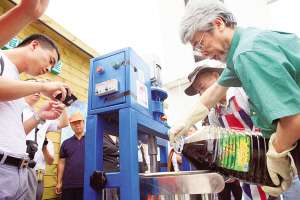Tianjin started the reuse project of edible oil, "garbage oil" turned into soap
Release Time:2014-06-26
Tianjin Northern Network News: In a specially designed waste cooking oil processor for four hours, the original dark brown waste cooking oil can be gorgeously "transformed" into "green soap" without any chemical synthetic substances for people to use... Yesterday, the Sino-Japanese Friendly Waste Edible Oil as Soap Project was officially launched in the West District of the Development Zone, which is also the first national environmental protection project specializing in the reuse of waste edible oil. Eight restaurants will be selected as the pilot projects, which are expected to be promoted to other areas of Binhai New Area after successful pilot projects.

Change 20 litres of waste oil into 35 kg of soap powder
In the neighbourhood center of the Western District of the development zone, a wooden house of about 25 square meters has become the "home" of the waste edible oil soap project. In the wooden house, the reporter saw a specially designed waste cooking oil processor, which is about 1 meter high, consisting of a dark blue bracket, a silver-white motor and a huge stainless steel barrel container.
"The process of turning waste cooking oil into soap powder is not complicated, and almost everyone can master it after learning several times." Operators at the site poured 20 litres of waste cooking oil, which had been prepared, into barrel containers and began to heat it. After warming up for about 10 minutes, the staff poured the soda solution into the cooking oil. The mixing rod with three protruding fan blades in the container started to rotate at a uniform speed.
"These blades play a major role in stirring, so that waste cooking oil and raw materials can be evenly mixed together. These two stainless steel blades with serrated teeth are mainly designed to prevent caking. Staff said that in the operation process, the operator does not need to watch the whole process, just need to come to see the reaction at intervals and add soda and other raw materials. About four hours later, the dark brown waste cooking oil has completely changed into a yellowish sticky soap powder. "Depending on the quality of the oil, about 35 to 36 kilograms of soap powder can be produced from 20 liters of waste cooking oil." Workers said that after drying, the dried soap powder can be used directly, or can be shaped into beautiful soap through containers.
"Green Soap" Feedback to Waste Oil Donors
In this project, eight restaurants in the West neighborhood center of Taiding Company in the development zone have become the first pilot projects, and the waste edible oil produced by them will provide continuous raw materials for the processor. In order to encourage and appreciate these restaurants to provide waste cooking oil free of charge, the green soap powder produced will be first returned to them for clean use.
"We provide an oil-water separator for each restaurant, using this container to store waste cooking oil, can ensure that the collected oil contains almost no water, and can be used directly." According to the restaurant's fuel consumption, it is planned to collect the waste cooking oil every three days or so, and then centralize the waste cooking oil into soap powder. Soap powder will be given back to the merchants as a reward.
"These soap powder in the manufacturing process, without any chemical synthetic substances, can be said to be very green, not only cleaner, but also after the use of water discharge, will not cause secondary pollution. My four daughters and grandchildren are always using this soap." Fujii Mitsuko, president of Japan Recycled Soap Association, is one of the sponsors of this project. She hopes that the pilot project of using waste cooking oil as soap can be carried out smoothly in Tianjin and promoted.
"Discharge of waste cooking oil directly will pollute water sources, and some of the gutter oil returned to the table by illegal means will do harm to the health of residents. Through the project of using waste cooking oil as soap, we hope to provide a sustainable and reproducible environmental protection solution for waste cooking oil." People concerned said.





